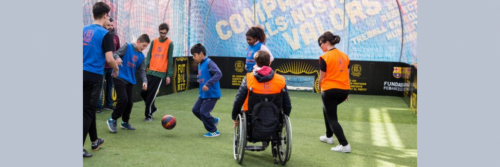
The United Nations Department of Economic and Social Affairs (UN DESA), Division for Inclusive Social Development (DISD), having the substantive mandate globally on sport for development and peace is organizing the second Multi-Stakeholder Dialogue on The Role of Sport in Addressing Inequalities in Times of Crisis and Recovery.
The outcome of the Dialogue will help shape the content and recommendations of this year’s Secretary General Report on Sport for Development and Peace to be submitted to the UN General Assembly in Sept, in keeping with the request of Member States. This year the Dialogue will capture the contributions of sport over the span of the COVID-19 pandemic and analyze the potential for sport to serve a catalytic role in countries’ efforts to build back better. The Dialogue will bring together stakeholders from diverse sectors together to share new research and good practices and to identify challenges, opportunities, and recommendations on the role that sport can play to address inequalities in times of crisis and recovery.
Sport and Inequalities in Crises and Recovery
In setting out to leave no one behind, UN Member States understood that inequalities will subside only when the furthest behind benefit to a greater degree and faster pace from policies and investment. By exacerbating and revealing the impact of inequalities and discrimination, the COVID-19 pandemic has made the case for addressing these injustices even more compelling.
Poorer countries are contending with a deeper, longer-lasting pandemic crisis. Income inequality between countries is estimated to have increased for the first time in a generation. Within countries, poorer households have been slower to recover incomes, face greater losses in education and livelihoods, and are disproportionally impacted by over-burdened health systems and mental health challenges. As countries struggle to recover from the pandemic, growing numbers of increasingly destructive climate disasters and a rising tide of conflict and violence, are generating new inequalities, while leaving already disadvantaged populations even further behind.
Against this backdrop of crisis and recovery, the Dialogue will explore ways to leverage sport as a low-cost, high-impact tool to address inequalities. The sport for development and peace movement has led to an ever-expanding range of good practices. Sport is increasingly being harnessed to connect people to education and employment settings; grow inclusive labour markets; empower women and girls and people with disabilities; improve the wellbeing of refugees; advance employment competences; confront discrimination, violent extremism, and violence against women; and engage communities in disaster relief and climate action. With more concerted and coordinated effort to target the gains to poor, vulnerable and marginalized communities, sport can make a powerful contribution to local, national, regional, and global efforts to address inequalities.
With greater coordination and support, sport can help to address inequalities in three key ways identified for this Dialogue:
- Catalyzing employment and livelihoods in poor and vulnerable communities
- Advancing the empowerment and social inclusion of disadvantaged and vulnerable groups
- Enabling peace and recovery and preventing violence in times of disasters and shocks










Add new comment